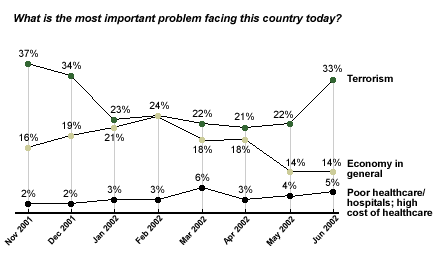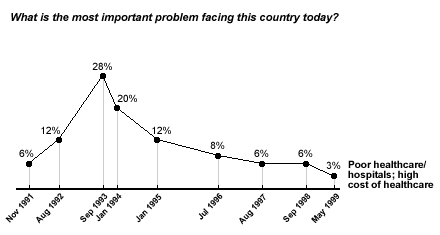A May 28 editorial in the New York Times, titled "Paralysis in Healthcare," bemoaned the federal government's seeming inability to pass legislation that many feel is vital to the health of all Americans. According to the editorial, "Early this year Congress and the White House entertained dreams of passing all kinds of health care legislation including a patients' bill of rights and prescription drug benefits for the elderly. But such talk has vanished. Lawmakers seem to be betting that voters will not punish them for inaction."
Lately, healthcare issues seem especially prone to legislative gridlock. The difference between the agendas of Republicans and Democrats is obviously a cause, as is the political upheaval resulting from the Sept. 11 terrorist attacks. But another major factor hampering the speed and efficiency with which federal legislation is passed is the current climate of public opinion. The assumption that the issues most important to the public tend to be the issues that lawmakers want to address promptly and efficiently raises the question: Just how important are healthcare issues to the American public at a time when headlines are dominated by corporate misconduct and the war on terrorism?
Recent Public Opinion About the Importance of Health Issues
On a monthly basis, the Gallup Poll asks Americans what they think is the most important problem facing this country today. On each such poll over the last several months, issues relating to terrorism and the economy dominate open-ended responses to this question. Healthcare issues are mentioned less frequently. During the first week of June, 33% of respondents identified terrorism as the most important problem, 14% identified the economy, and 5% identified healthcare.

Despite the publicity about safety and medical errors, the cost of prescription drugs, and access to needed services, perceived importance of healthcare issues continues to be very low.
The Importance of the Healthcare Problem During the 1990s
Compare the current climate to that of the early 1990s. Leading up to President Clinton's failed attempt to pass a major healthcare reform bill in 1994, the percentage of Americans who felt healthcare was the country's most important problem had soared to 28% (September 1993). The highly publicized reform initiative fueled media coverage, which helped keep healthcare issues at the forefront of many Americans' attention. After the reform plan failed, the percentage of people who said healthcare was the country's most important problem began to drop. It remained above 20% throughout 1994 when Clinton's plan was being considered, but it dropped to 12% by January 1995, and has not returned to that level since, most often registering percentages in the single digits.

Key Points
In a representative democracy, public opinion plays a role in setting government priorities. Healthcare questions are undoubtedly still of great concern to many Americans -- but they are being crowded out by issues of even greater concern. Until Americans again feel relatively secure from the dual threat of domestic terrorism and economic uncertainty, they're unlikely to muster enough political pressure to achieve significant healthcare reform. In other words, the gridlock is likely to continue.
*Results are based on telephone interviews with 1,010 national adults, aged 18 and older, conducted June 3-6, 2002. For results based on this total sample of national adults, one can say with 95% confidence that the margin of sampling error is ±3%.